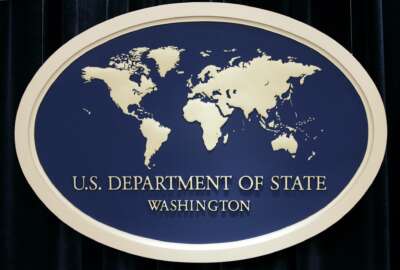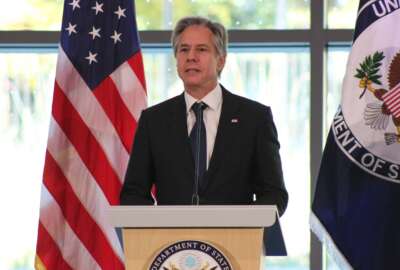Foreign Service plans to rein in robust hiring efforts, following recent budget cuts
The Foreign Service will have fewer resources to continue its robust hiring efforts — but plans to keep hiring above its rate of attrition.
The State Department is looking to rein in some of its record hiring efforts later this year, after Congress cut the department’s overall budget by nearly 7% in its fiscal 2024 spending deal.
Amb. Marcia Bernicat, the director general of the Foreign Service and the director of the Bureau of Global Talent Management, said the new budget means the Foreign Service will have fewer resources to continue its robust hiring efforts — but plans to keep hiring above its rate of attrition.
“We got into a deficit of staffing the last time we slowed hiring, so our leadership is dedicated to putting a much smaller set of resources, thanks to the new budget, to hiring,” Bernicat said on April 8 during a webinar hosted by the American Foreign Service Association (AFSA). “We are committed to continue to hire above attrition, but it will slow somewhat.”
Bernicat said the Foreign Service plans to bring in a “robust” class of new Foreign Service officers in July, but expects the following class in September will be about half as large.
The Foreign Service adds about 200-220 new FSOs to its rank with each incoming class.
Deputy Secretary of State for Management and Resources Richard Verma expressed concern over the recent budget cuts earlier this month, saying the department “will have to make tradeoffs,” and that “the dollars are simply unable to stretch as far as we need to meet the moment.”
Verma said the State Department faces an average 13% staff gap, and 15% of ambassador nominees remain unconfirmed.
The Foreign Service has a workforce of nearly 14,000 employees at more than 250 missions across the world. About 8,200 employees are generalists and 5,600 are specialists.
Bernicat said when she joined the Foreign Service more than 40 years ago, the Foreign Service workforce had about 5,000 employees.
“We’ve grown significantly over time, not just in terms of numbers, but especially in terms of the wide variety and diversity of skills and experiences that we have brought in,” Bernicat said. “I’m not only pleased with where we are today, in terms of talent we possess, but also very optimistic about the future.”
Bernicat said the Foreign Service is at an “inflection point,” and is modernizing to keep pace with diplomatic challenges overseas.
“We have learned over time to be far more agile … We are so much more field-forward than we used to be,” Bernicat said. “And the responses to crises are demanding that we find ways to be even more agile.”
Because of the Foreign Service’s major hiring efforts in recent years, much of the workforce is still new to the job. Bernicat said 21% of its current workforce were hired since March 2020.
“We are a young Foreign Service, seniority-wise,” Bernicat said, although the average age of new hires has ticked up slightly, to 36 years old.
Bernicat said the Foreign Service has the third-lowest attrition rate across the entire federal workforce. With about 3% annual attrition, she said that roughly tracks with the number of employees who retire every year.
A larger Foreign Service workforce has allowed it to set up a “training float,” meaning a cohort of Foreign Service officers, at any time, is pulled from frontline duties to enroll in continuous learning and training.
The Foreign Service Institute, in response, is expanding its course offerings beyond foreign languages, to include cybersecurity, STEM, health and climate.
Bernicat said the department is also introducing a training float to its civil service workforce, “so that they too are gaining, have the opportunity to gain, either gain or deepen their knowledge and in the areas that we need them to.”
The Foreign Service has launched a learning policy that encourages supervisors to provide at least 40 hours a year of training time for their staff. Bernicat said the department is also taking steps to ensure management values continuous learning when making promotion decisions.
“Too often, people think of training as a wasted year, and that it’s a year they don’t have information to add to their [Employee Evaluation Report] that will make them more competitive for promotion,” Bernicat said.
“If we don’t learn, if we don’t keep adapting, as the Secretary has pointed out, we’re going to find it increasingly difficult to do our work in such a dynamic world as we’re living in today,” she added.
Copyright © 2025 Federal News Network. All rights reserved. This website is not intended for users located within the European Economic Area.
Jory Heckman is a reporter at Federal News Network covering U.S. Postal Service, IRS, big data and technology issues.
Follow @jheckmanWFED





